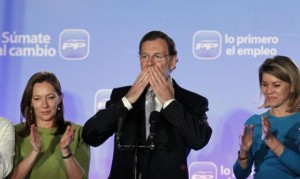“There will be no miracles, I didn’t promise any,” PP leader Mariano Rajoy declared pragmatically on Sunday night after his party took almost 45 percent of the vote, winning an absolute majority in Congress in its strongest ever election result.

With 186 seats in the 350-seat Congress, Rajoy, who is due to take office in a month, will have a virtually free hand to carry out reforms, although no one knows for sure what steps the new government plans to take to end years of recession and anaemic growth, the euro zone’s highest unemployment rate and an escalating debt crisis.
Having kept his cards close to his chest throughout the campaign, Rajoy will now be expected to show them – and voters and financial markets will be looking for immediate action. Analysts predicted that the new government is likely to push through additional cost-cutting measures quickly after it takes office and Rajoy indicated as much on Sunday: “Difficult times are coming,” he noted.
Spain’s borrowing costs are at their highest since the euro zone was formed and yields on 10-year bonds soared last week to close to 7 percent, a level that forced other countries like Portugal and Greece to seek international bail-outs. The Spanish Treasury heads back to the markets with debt auctions on Tuesday and Thursday this week, which will test confidence in Rajoy’s pending leadership.
It is likely, initially at least, that markets will respond favourably to the election result. An absolute majority government will mean greater political stability, while Rajoy and the PP have a long history of being pro-business and market friendly. In the longer term, how Spain fairs will depend on what measures the new government takes – or can take – to prevent Spain being sucked deeper into the debt maelstrom currently threatening the whole euro zone.
Any further cutbacks, adding to those already implemented by the outgoing Socialist administration of Prime Minister José Luis Rodríguez Zapatero, are likely to meet with public resistance. The PP won the election less on its own merits than as a result of voter weariness: weariness with the ineffectual government of Zapatero and with politics in general. In effect, Rajoy’s blank check has been won by default.
The PP gained 550,000 more votes than in the 2008 general election, while the Socialist vote count dropped by more than 4.4 million to 28.7 percent – its worst showing since the transition to democracy. Other parties, among them the communist-led United Left and Basque nationalist coalition AMAIUR, also saw considerable gains at the Socialists’ expense.
The outcome is therefore not so much a vote of confidence for the future in the PP, but rather a reflection of voters’ desire to punish the Socialists. In that light, though Rajoy will face little opposition in Congress, he may well find he faces his greatest obstacles on the Spanish street.
Leave a Reply
You must be logged in to post a comment.